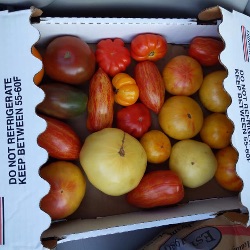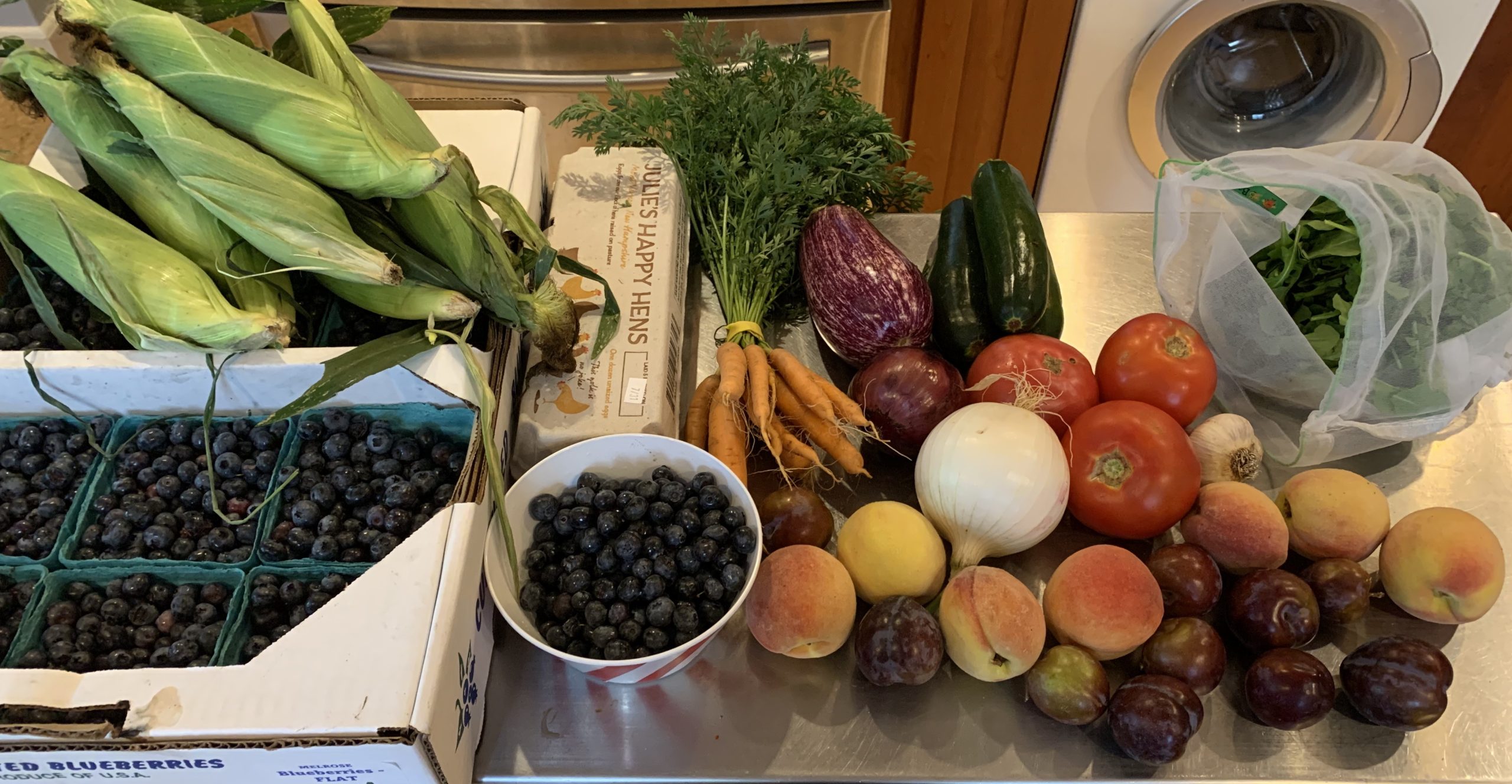By Julie Pottier-Brown, Operations Manager
I heard years ago that when the lovely bakery that is A&J King in Salem wanted to add a new cookie to its line-up it took a year to figure out how to fit the new item into the production line. This was before their expansion to the second/wholesale Boston Street location. I imagine that the mixing, proofing, baking, packaging, etc. of many different breads is a tight daily/overnight schedule.
I relay this story as I think about flow; about how our goods get from the farm to us, from us to you and how everything flows to the depots and back. A volunteer last week was surprised that all of the food for the entire coop was at the Marblehead location where we were portioning out the special orders and putting each depot’s items on the correct pallet to be loaded onto the correct truck.
 We rent 2 trucks every depot day. One, driven by Adriaan “Skip” Schippers, goes to Western Massachusetts. He is hauling the watermelons, most of the tomatoes, leeks, and many of our special orders today. The other truck, driven by Dennis Cowley, stays closer to home and goes to Beverly, Gloucester, Peabody, Rockport, and occasionally New Hampshire. He will bring us tomatoes and peaches today. Once the trucks are full, Skip comes to the Marblehead depot and starts the unload around 12:30 – 1pm. Dennis goes to the Marblehead office where we have a refrigerator, freezer and what we lovingly refer to as ”Cooler Mountain”. Dennis picks up the coolers for eggs, cheese, mushrooms, extras for sale, pasta, frozen special orders. He loads the bread which was delivered there in the wee hours, split by location by Ann Sabin, as well as the general store items. When both trucks are at the Marblehead depot, the goods on each truck that belong in Marblehead come off, and the goods that need to go to the Melrose and Salem locations are loaded onto their respective trucks.
We rent 2 trucks every depot day. One, driven by Adriaan “Skip” Schippers, goes to Western Massachusetts. He is hauling the watermelons, most of the tomatoes, leeks, and many of our special orders today. The other truck, driven by Dennis Cowley, stays closer to home and goes to Beverly, Gloucester, Peabody, Rockport, and occasionally New Hampshire. He will bring us tomatoes and peaches today. Once the trucks are full, Skip comes to the Marblehead depot and starts the unload around 12:30 – 1pm. Dennis goes to the Marblehead office where we have a refrigerator, freezer and what we lovingly refer to as ”Cooler Mountain”. Dennis picks up the coolers for eggs, cheese, mushrooms, extras for sale, pasta, frozen special orders. He loads the bread which was delivered there in the wee hours, split by location by Ann Sabin, as well as the general store items. When both trucks are at the Marblehead depot, the goods on each truck that belong in Marblehead come off, and the goods that need to go to the Melrose and Salem locations are loaded onto their respective trucks.
We have a color coding system. Marblehead is red, Melrose is blue, and Salem is green. Special order stickers are those colors, the tape on the cheese, egg or mushroom coolers are those colors, and the zip ties on the clips on the green and yellow crates from Riverland farm are those colors (though Salems’ zip ties are clear and not green – it just worked out that way when we first designed the system). The idea is that we can see the colors as they get loaded onto the trucks (or almost left behind) and we can fix mistakes before – or as – they are happening.
The next time you are picking up your share, notice the colored zip ties on the clips holding up the chalkboard signs. Notice the veggie bins, wax boxes, berry flats, paper bread bags, coolers for all the things. These get sent out to each depot, and packed away in the shed at end of night. Then what?
Part two next week…
Thanks for supporting local, and choosing to do so with the Farm Direct Coop.
Julie

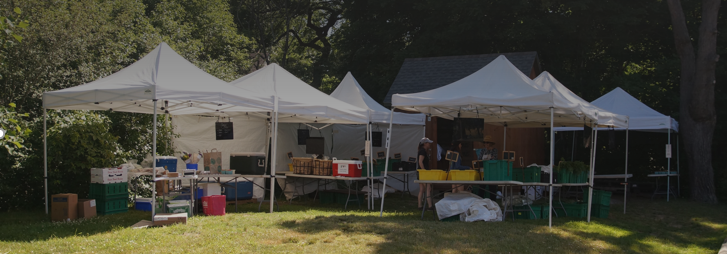
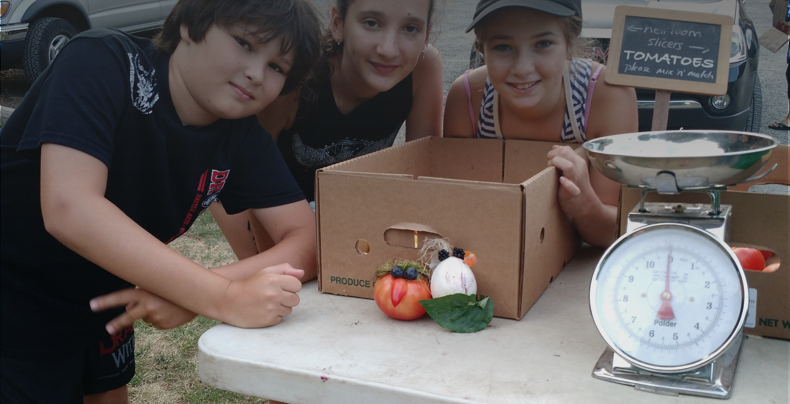
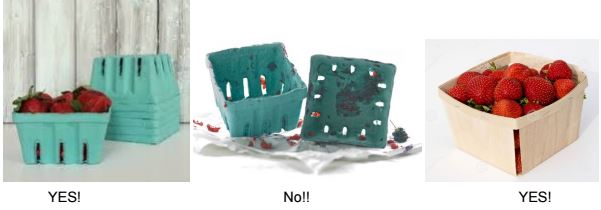
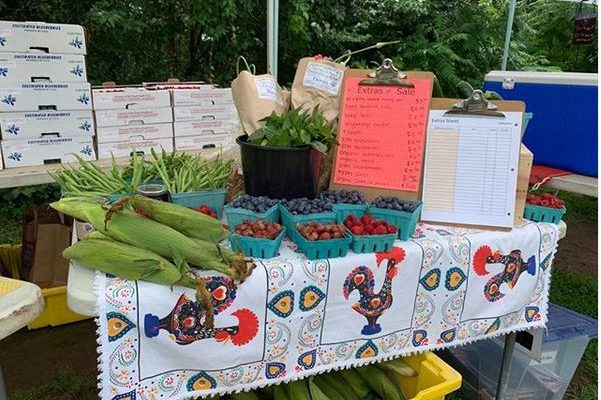
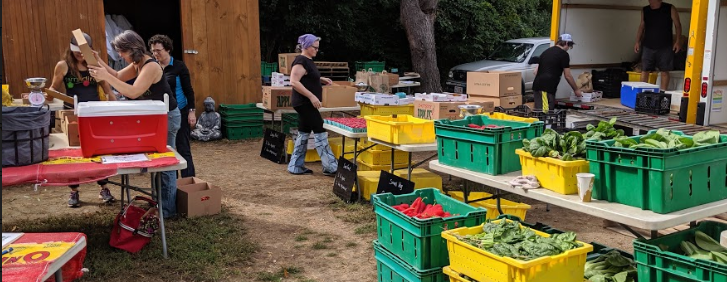
 We rent 2 trucks every depot day. One, driven by Adriaan “Skip” Schippers, goes to Western Massachusetts. He is hauling the watermelons, most of the tomatoes, leeks, and many of our special orders today. The other truck, driven by Dennis Cowley, stays closer to home and goes to Beverly, Gloucester, Peabody, Rockport, and occasionally New Hampshire. He will bring us tomatoes and peaches today. Once the trucks are full, Skip comes to the Marblehead depot and starts the unload around 12:30 – 1pm. Dennis goes to the Marblehead office where we have a refrigerator, freezer and what we lovingly refer to as ”Cooler Mountain”. Dennis picks up the coolers for eggs, cheese, mushrooms, extras for sale, pasta, frozen special orders. He loads the bread which was delivered there in the wee hours, split by location by Ann Sabin, as well as the general store items. When both trucks are at the Marblehead depot, the goods on each truck that belong in Marblehead come off, and the goods that need to go to the Melrose and Salem locations are loaded onto their respective trucks.
We rent 2 trucks every depot day. One, driven by Adriaan “Skip” Schippers, goes to Western Massachusetts. He is hauling the watermelons, most of the tomatoes, leeks, and many of our special orders today. The other truck, driven by Dennis Cowley, stays closer to home and goes to Beverly, Gloucester, Peabody, Rockport, and occasionally New Hampshire. He will bring us tomatoes and peaches today. Once the trucks are full, Skip comes to the Marblehead depot and starts the unload around 12:30 – 1pm. Dennis goes to the Marblehead office where we have a refrigerator, freezer and what we lovingly refer to as ”Cooler Mountain”. Dennis picks up the coolers for eggs, cheese, mushrooms, extras for sale, pasta, frozen special orders. He loads the bread which was delivered there in the wee hours, split by location by Ann Sabin, as well as the general store items. When both trucks are at the Marblehead depot, the goods on each truck that belong in Marblehead come off, and the goods that need to go to the Melrose and Salem locations are loaded onto their respective trucks.
